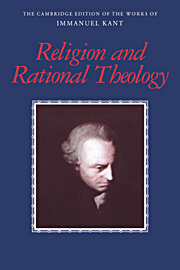Book contents
- Frontmatter
- Contents
- General editors' preface
- General introduction
- What does it mean to orient oneself in thinking? (1786)
- On the miscarriage of all philosophical trials in theodicy (1791)
- Religion within the boundaries of mere reason (1793)
- The end of all things (1794)
- The conflict of the faculties (1798)
- Preface to Reinhold Bernhard Jachmann's Examination of the Kantian Philosophy of Religion (1800)
- Lectures on the philosophical doctrine of religion (1817)
- Editorial notes
- Glossary
- Index of names
- Index of subjects
- Index of biblical references
The end of all things (1794)
Published online by Cambridge University Press: 05 June 2012
- Frontmatter
- Contents
- General editors' preface
- General introduction
- What does it mean to orient oneself in thinking? (1786)
- On the miscarriage of all philosophical trials in theodicy (1791)
- Religion within the boundaries of mere reason (1793)
- The end of all things (1794)
- The conflict of the faculties (1798)
- Preface to Reinhold Bernhard Jachmann's Examination of the Kantian Philosophy of Religion (1800)
- Lectures on the philosophical doctrine of religion (1817)
- Editorial notes
- Glossary
- Index of names
- Index of subjects
- Index of biblical references
Summary
Translator's introduction
Das Ende aller Dinge was first published in June 1794 in the Berlinische Monatschrift 23, pp. 495–522.
By 1792 J. E. Biester, editor of the Berlinische Monatschrift, had moved his publication to Jena to avoid the Prussian religious censors. On April 10, 1794, Kant wrote him criticizing the political philosophy of the Hanover conservative August Rehberg and connecting it with the censorship activities of Hermes and Hillmer, who “have taken their positions as overseers of secondary schools and have thereby acquired influence over the universities with respect to how and what is supposed to be taught there.” Then he abruptly ends the letter with this final paragraph: “The essay I will send you soon is entitled ‘The End of All Things,’ which will be partly plaintive and partly funny to read” (AK 11:496–7).
Having endured the difficulties with the censors in getting the Religion published, Kant's outlook was anything but sanguine regarding the prospects for free thought and discussion of religious topics in Prussia. “The End of All Things” is a plea for Christians to be true to what is best in their religion by adopting a “liberal” way of thinking; but because it is a plea directed at the Prussian religious authorities, it is one Kant expects to fall on deaf ears. Thus it is couched in the form of a sly, bitter satire, which approaches its political theme only indirectly.
- Type
- Chapter
- Information
- Religion and Rational Theology , pp. 217 - 232Publisher: Cambridge University PressPrint publication year: 1996
- 2
- Cited by



